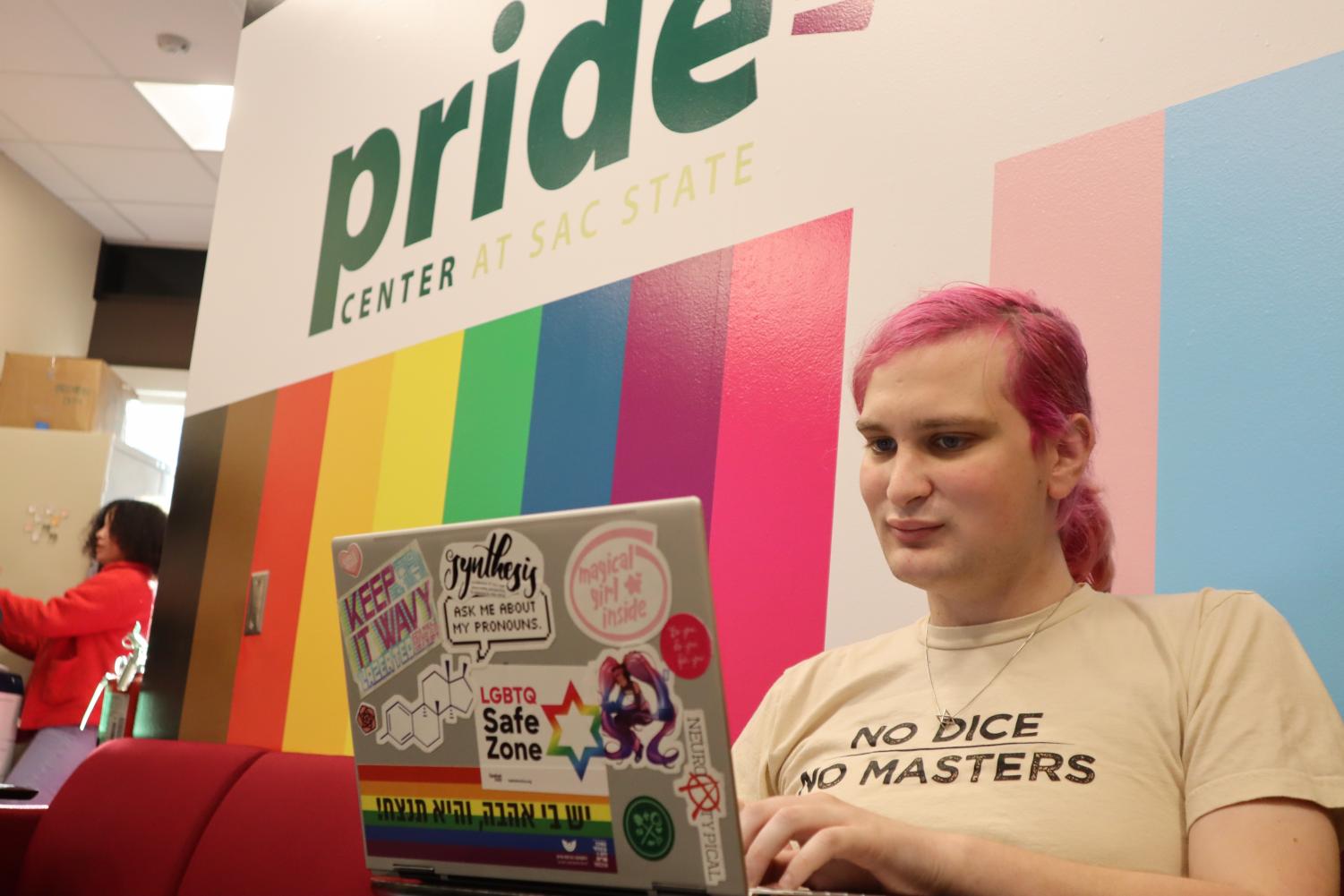Your donation will support the student journalists of Sacramento State University. Your contribution will allow us to purchase equipment and cover our annual website hosting costs.
‘It’s called a deadname for a reason’: Sac State LGBTQ+ students on importance of preferred names
AB 2023 would allow individuals to use preferred names on diploma
February 13, 2020
Lee Kennedy, a communications major at Sacramento State who identifies as transgender and nonbinary, was in a crowded classroom when their professor asked them what their name was before they changed it.
They responded by telling their professor that they didn’t feel comfortable talking about it.
“It’s called a deadname for a reason,” Kennedy said. “It’s not really anybody’s business if I’ve changed my name.”
Story continues below photo.

Lee Kennedy, a communications major, poses in the tea garden under the Sac State Library on Wednesday, Feb. 12. Kennedy said that, “it’s not really anybody’s business if ‘they’ve’ changed ‘their’ name.”
Deadnaming is when someone, intentionally or not, refers to a person who is transgender by the name they used before they transitioned.
A 2017 survey of over 12,000 LGBTQ+ youth conducted by the Human Rights Foundation Campaign found that many young people “feel pressure from their families, schools or communities to conform to societal expectations of gender.”
The survey said that those who do not conform and who do not receive “gender-affirming support or are forced to hide their gender identities” are at risk of experiencing higher mental health risks such as depression, anxiety, self harm and suicide.
Assemblymember David Chiu introduced Assembly Bill 2023, formally titled Affirming Transgender And Nonbinary Students’ Names In College, in January. If passed, the bill would allow transgender and nonbinary students to have their preferred names printed on their diploma.
The bill would also streamline a process for public universities to update their records so that the name and gender an individual holds would be reflected on transcripts and diplomas.
RELATED: Faces of PRIDE at Sac State
Documents at Sac State and other public universities in California require a student’s legal name. That includes transcripts, financial aid documents and medical records.
Kennedy said that while the issue may not be “significant to cisgender” people — or people who identify as their assigned gender at birth — there is an emotional impact that deadnaming evokes for others.
“When you have to see something or be referred to as something that you don’t feel reflects who you are, it just creates a lot more mental stress and mental instability than people recognize,” Kennedy said. “It’s too much mental and emotional labor to have to navigate around my deadname.”
In August of last year, Assembly Bill 711 was signed into law by California Governor Gavin Newsom. The bill, introduced by Chiu’s office, ensures that graduates of public K-12 schools in California are able to get their preferred names on their transcripts and diplomas.
Jen Kwart, communications director for Chiu, said their office has heard stories about similar issues affecting transgender and nonbinary students in college.
“We felt like we needed to extend those protections to higher ed,” Kwart said. “Transgender students already face a lot of barriers. And the name on someone’s diploma just really shouldn’t be another barrier that someone has to overcome.”
Kwart said the bill, if passed, would affect the graduating class of 2022 at public universities and community colleges state-wide.
In January, the Division of Inclusive Excellence at Sac State sent out an email informing students of a campus-wide effort to expand preferred name usage.
The change would be reflected in the campus directory and all campus systems, including Canvas and Sac State emails, according to the Preferred Names FAQ site.
However, there are still documents that require a student’s legal name at Sac State, including transcripts, financial aid documents and medical records. In addition, although it isn’t a legal document, students are required to use their legal names on diplomas.
Sac State Vice President of Student Affairs Ed Mills, said the university system requires that a student’s name be on their diploma because it is an “official document.” Mills said that while he would “love to honor the name that someone wants to go by,” anything outside of the university’s regulations becomes a legal matter.
To have a name legally changed, a student would need to go to their local county court anywhere in California and file a Petition for Name Change, according to the California Courts website. The process can take up to three months.
Sac State isn’t the only California public university where this issue has come up. In December of last year, University of California, Berkeley alumna Juniperangelica Cordova spoke out against her university for deadnaming her on her diploma in a tweet.
Story continues below tweet.
Daaaaaam ittttt. 18 years of working toward a college degree and after /everything/ @UCBerkeley put me through … only to finally get my diploma in the mail aND MISS UC “I hate trans people” BERKELEY DEAD NAME$ ME. HAHAHAHA I give up pic.twitter.com/aL2BoaNcdq
— gia onomatopoeia (@missgiagiagia) December 3, 2019
According to a Daily Californian article, the use of Cordova’s deadname in her diploma “entails erasing everything she has worked toward.”
Todd Migliaccio, department chair of sociology at Sac State who specializes in gender studies, said that getting a name change on a diploma is a difficult process.
“They’re being forced to maintain and assume an identity that’s not their identity,” Migliaccio said. “And they’re being forced by a system that doesn’t accept who they are. It’s a reminder that they’re ‘othered.’”
He said that most of this transphobia is push back from normative ideals around gender being challenged. He said that being forced to “challenge that larger perspective” can spark anger.
Rosie Quinzel is a computer science major at Sac State who identifies as a transgender woman. She said the bill would make it “much easier” for her. She wouldn’t need to go to a government agency in order to get her name changed on her diploma and could just go through the school.
“Because of personal reasons, I don’t have access to a lot of my documentation besides my driver’s license, which still doesn’t even have the right name,” Quinzel said.
Quinzel said she’s glad her student identification card has the correct name on it, so she doesn’t have to worry about people she knew before her transition calling her by her deadname.
Kelsey Cole, a child development major who identifies as bisexual, said she agrees transgender students should have their preferred names on their diplomas.
“It’s not like I’m signing up to get a house or something,” Cole said. “It’s my diploma that I earned. I would like my name on it.”
Cole said that while she has never experienced being deadnamed, she does appreciate that since transferring from Sierra College to Sac State, she has had teachers ask, “What do you prefer to go by?”
Kennedy said that it’s tiring to be deadnamed and that this bill will help other transgender students. The bill would make “that one aspect of (their) life so (much) simpler.”


Franklin • Feb 25, 2020 at 12:18 pm
I really didn’t want to write this, but I feel like someone does. There is a reason legal documents need to have your legal name and it has nothing to do with transphobia or people trying to be disrespectful or unwelcoming in any way. Let me go through a few here.
• Financial Aid: This requires your legal name, which is linked to your taxes, and thus to your social security number. Furthermore, if you’re under 24, all your parent’s tax information and all their socials are all linked as well. This is incredibly sensitive information and they need to make sure of who you are before they even talk to you about it. Usually requiring presentation of acceptable identification before divulging any very personal details. If you don’t legally change your name, you will not have any acceptable form of identification with your chosen name, which can be a problem. I’m pretty sure a lot of these requirements are far out of the control of the university and have to do with the way of properly handling sensitive and confidential information. This isn’t because they are transphobic, they are protecting confidential information.
• Name on the degree/transcript: I think there are a couple things that need to be discussed on this front. For starters the real reason your piece of paper has value isn’t because of the universities name at the top, but because of the accreditation that the university holds. For example, the gold standard in computer science and engineering is an ABET accreditation. I will stick to an engineering example in this case because it’s what I know. This accreditation is important for getting licensed as a professional engineer or working in another country which has reciprocity agreements with other accreditations. These are legal documents when you start talking about how this effect the amount of work experience required to get a PE license (Professional engineer). An ABET accredited degree means you need 24 months of experience vs the 72 months required without accreditation to obtain your PE license. You cannot just put a non-legal name on your degree and transcript because the licensing board will have no way of verifying who you are! Not to mention there might be clauses within the accreditation agreement that would prohibit such action.
It doesn’t stop at engineers though, think about doctors, nurse practitioners, veterinarians. People who can prescribe medication. There needs to be a very clear way of identifying one’s self through a chain of legal documents. You can’t expect to never have to use your legal name.
• Medical Records: I feel like this one is self-explanatory. It goes back to confidentiality and sensitive information. They want to be sure your vaccinated and have proof of those vaccinations, so you don’t put others at risk.
If you weren’t to have all of this done in your preferred name, you must legally get it changed. This will give you proper identification, a name that matches your social, and an official record of who you are that is traceable and verifiable. This isn’t a problem with transphobia, it’s one of paperwork, protection of your personal information, and a verifiable identity.
Wishful Student • Feb 13, 2020 at 11:08 pm
I don’t understand why it’s so hard for California colleges to let people use their chosen names, hasn’t this been an issue for long enough? Especially as California is one of the more progressive states, this should have been taken care of long before this. It’s good that there are steps being taken to respect people’s choices, but the fact that the bill won’t take effect until 2022 means that a lot of people will still face that erasure until then. I wish colleges would be proactive and meet these requirements before the deadline for the good of their students, rather than because they were forced to by a deadline.